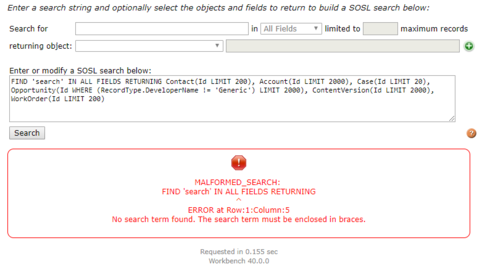I’m working on a skuidified replacement for the global search function on 10.0.5. The goal is to have a simple google like search within the skuid framework that provides contextual starting points that is more refined than the salesforce search and visually better. The starting point for this solutions is from this documentation: https://docs.skuid.com/latest/en/skuid/api/skuid_sfdc.html
With the skuid.sfdc.search API, the SOSL string rendered does not conform to the SOSL protocol for the search string, which is generating inaccurate & unusable search results.
This is the syntax that the API generates:
FIND ‘Search Text String*’ IN
This is the syntax that SOSL expects for a context search:
FIND {Search Text String} IN
The current API search syntax yields a bunch of garbage. After playing around with a variety of syntaxes, and comparing to search results in the workbench and native salesforce UI, it became apparent that the API was wrapping whatever input with the single quote and wildcard and I have no control over it. To top it off, if I try to wrap with {} it totally bombs because the API wraps that as well and the search chokes.
The lack of a global search replacement poses a real challenge.
Question
SOSL bug (skuid.sfdc.search)
 +8
+8Enter your E-mail address. We'll send you an e-mail with instructions to reset your password.





